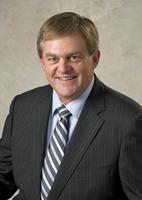
Education and Early Career
David Alward was born in Beverly, Massachusetts on 2 December 1959, the son of the Reverend Ford and Jean Alward. His family returned to Canada when he was just six months old. The Alwards lived throughout the Maritimes, eventually settling in New Brunswick. Alward graduated from Nackawic Senior High School in 1977 and then attended Bryan College in Tennessee. He graduated with a Bachelor of Arts in psychology.
Prior to entering politics, Alward worked with Canada Customs and with Human Resource Development Canada from 1982 to 1996. He was self-employed as a human resources and community development consultant from 1996 to 1999.
Provincial Politics
Alward was first elected to the New Brunswick Legislature in 1999, for the riding of Woodstock. He was one of the 44 Progressive Conservative (PC) MLAs to win a seat in Premier Bernard Lord’s landslide victory that year. In that election, the Liberals were reduced to just 10 seats (including one held by Shawn Graham, who would go on to become Liberal leader and then premier in 2006).
Alward was re-elected in the 2003 election, in which the PCs saw their seat total reduced to just 28. However, they remained in power under Lord, and in June 2003 Alward became minister of Agriculture, Fisheries and Aquaculture in the provincial Cabinet.
The next three years proved difficult for the PCs, and they lost the 2006 election to the Liberals under Shawn Graham. However, Alward held onto his seat, and served as opposition critic to his former ministry, and as critic for Post-Secondary Education and Labour.
Bernard Lord resigned as PC leader soon after the election. The party appointed veteran MLA Jeannot Volpé as interim leader and scheduled a leadership convention for October 2008. Alward won that contest, defeating former party president and business executive Robert MacLeod, and became leader of the Opposition.
Alward's soft-spoken, self-effacing personality contrasted sharply with the youth and brashness of Shawn Graham. When a provincial election was called for 27 September 2010, pundits wondered how Alward would fare in the leaders' debates, particularly the French debate. While Alward did not shine, he held his own and went on to win an impressive victory, attributed in part to widespread public anger over the Graham government's proposal to sell the debt-laden provincial electric utility, NB Power, to Hydro Québec. Alward became New Brunswick's 32nd premier, with 42 seats in the Legislature compared to 13 for the Liberals.
Premier
Alward's first year in government was characterized by caution and consultation. This included province-wide consultations on the province's energy future (including the fate of NB Power) and on how the province's chronic and burgeoning debt could be managed.
In 2012, the Alward government introduced legislation to cut property taxes for businesses, farms, rental properties and cottages, despite concerns over the province’s deficit. It also unveiled a new forestry strategy, increasing by 20 per cent the amount of softwood forestry companies could take from Crown land. Alward said this would lead to more forestry and construction jobs. “It’s about putting more boots in the woods and the mills,” he said.
During the 2014 election campaign, Alward ran under the campaign slogan “Say Yes” to resource development, jobs and prosperity. He insisted that the controversial petroleum industry practice of hydraulic fracturing, or fracking (for shale gas extraction) was New Brunswick’s only chance to become an economically rich “have” province, where its youth would stay. But Liberal Leader Brian Gallant said Alward’s government had made a “mess” of the economy and ran with a call for a moratorium on fracking by the shale gas industry until more study could be done.
The Liberals won 27 seats compared to the Tories’ 21 in the 22 September 2014 election. The outgoing premier said he was proud of his campaign, and that he understood the shale gas issue had created regional divisions in the province. Alward stepped down as PC leader – but not as MLA – after his government's defeat.
Consul General
In April 2015, Prime Minister Stephen Harper named Alward Canada’s consul general to New England, replacing former Prince Edward Island premier Pat Binns in the federal government's trade office in Boston. The following month Alward officially resigned his seat in the New Brunswick Legislature, where he had served from 1999 to 2015.
“So much of the work that I am responsible for here [in Boston] is about relationships. The trade that takes place between our two nations is incredible,” he said, in early 2016. “People don't realize what goes on every day. There is literally $2 billion of trade that goes on between Canada and US every day. I think both countries probably take it for granted.”
Alward, who noted that his new post is not much different from being a premier, said Canada buys more goods from the US than China, Japan, Great Britain and Germany combined.
As consul general he maintains an active Twitter account that often describes the success stories of Canadian companies in New England.

 Share on Facebook
Share on Facebook Share on X
Share on X Share by Email
Share by Email Share on Google Classroom
Share on Google Classroom

